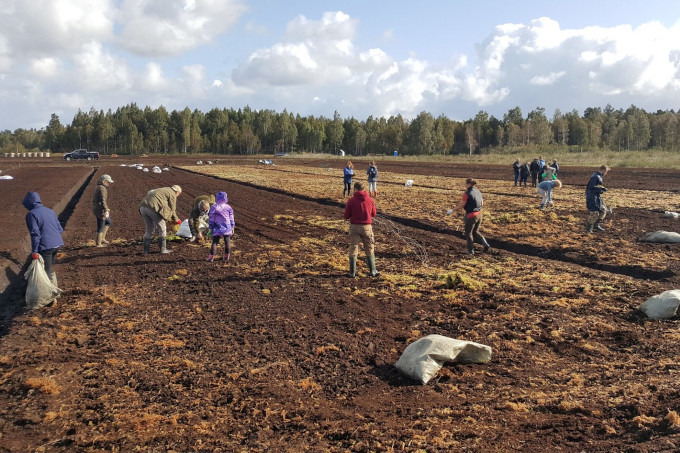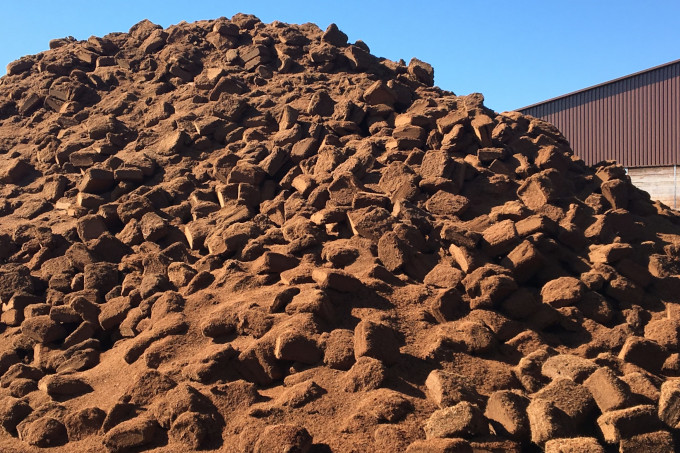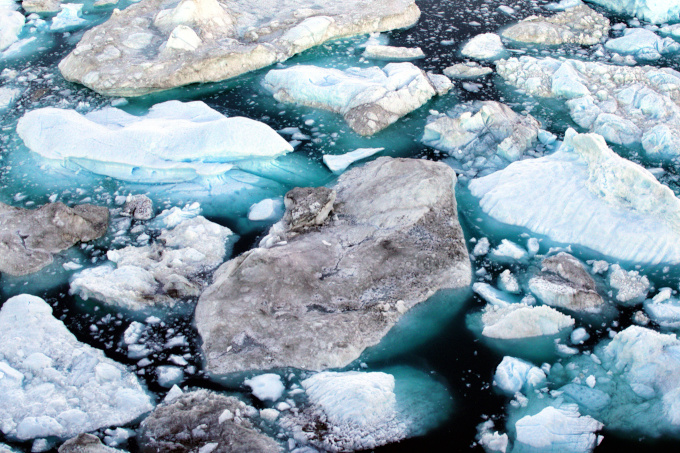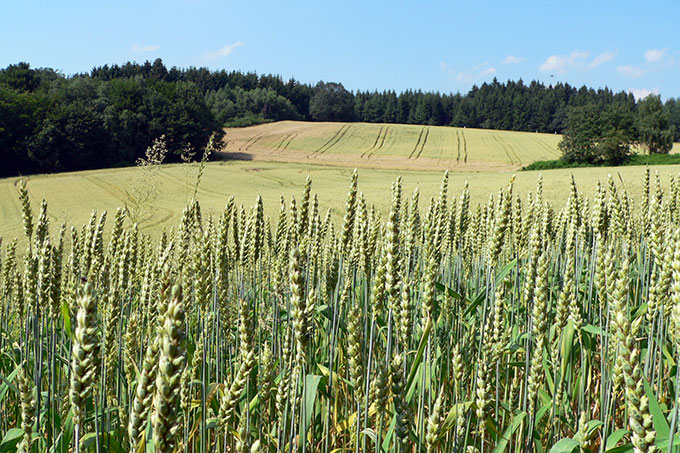Testing of innovative techniques: Sphagnum transplantation on post-mining bare peat, Aukštumala site in Lithuania - photo: LFN team
Wet is beautiful
The time of unambitious targets in peatland restoration must be over
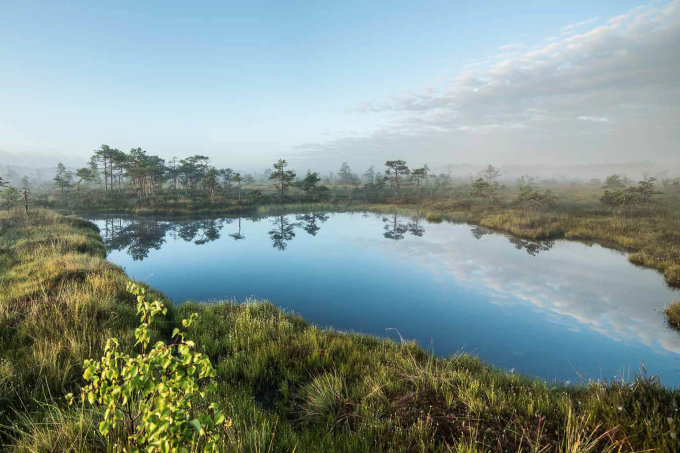
Bog pool in Latvia - photo: Aleksandrs Galaks
19 August 2021 – The climate crisis is back at the top of the global agenda. Last week’s report by the International Panel on Climate Change shows that urgent and decisive action is needed to keep global warming below 2 degrees Celsius. In this context, peatlands play a particularly relevant role. In relation to their area, they store more carbon than any other terrestrial ecosystem – but only when they are wet and healthy. As 90 % of our global peatlands are still pristine and function as net carbon sinks, the most important measure is to keep them this way. On the other hand, the drainage of 10 to 15 % of peatlands worldwide is responsible for up to 7 % of human-caused global greenhouse gas emissions (IPCC Report, 2021) – that is more than all air traffic combined.
The science is clear: peatlands are our powerful ally in the fight against climate breakdown. By restoring degraded peatlands, we can avoid substantial future emissions and over time, recreate natural carbon sinks – necessary for reaching global carbon neutrality. That’s why Peatland conservation organisations and experts from across the world have joined together in the United Nations Environment Programme’s Global Peatlands Initiative (GPI) to pledge their collective commitment to tackling climate change, protecting nature and forging ahead for the health of our planet. NABU is part of this worldwide initiative and an implementing partner of the UN Decade on Ecosystem Restoration.
Currently, the network of organisations is undertaking a press and social media collaboration to share experiences and celebrate the successes of ongoing work on peatland restoration. The good news is: our projects show that we can successfully restore degraded peatlands, stop further emissions and even re-establish net carbon sinks. The joint effort of the collaboration highlights the importance of peatlands to the planet and focus on the different ways that organisations are working towards their conservation, restoration and sustainable management across the world. The relay of stories from peatland projects worldwide started with the UK as the host of the upcoming United Nations climate change conference, COP26. The last stop of the campaign was in Wales, showcasing the LIFE Welsh Raised Bogs Project. Now NABU is taking over the baton by showing that even complex peatland restoration is possible. NABU is currently implementing the project LIFE Peat Restore, which consists of 1) large-scale rewetting of peatlands across borders with a joint approach on measuring and monitoring the carbon impact of the restoration efforts, and 2) bringing the peat industry, policy makers and nature conservationists to the table to find ways out of unsustainable peat consumption.
Within the project LIFE Peat Restore, NABU and eight international partners are currently working on the restoration of degraded peatlands in five EU countries. The project area covers from the largest site of 3.343 hectares, the Suursoo Leidissoo Peatland, in north-western Estonia, to the smallest area in Germany, the Biesenthaler Becken, a stone's throw from Berlin. By the end of the year, 5.300 hectares of peatlands will have been restored by LIFE Peat Restore partners. But it's not only about size, it's about collaboration and multinational partnerships in insecure times, networking and exchange. We all learnt a lot from each other and succeeded to establish a joint measuring and monitoring programme to demonstrate the greenhouse gas emissions could already have been substantially reduced after implementing the restoration measures.
Besides restoration measures on the ground, we bring attention to the urgency of transition of unsustainable sectors like the phase-out of peat extraction and the need of a real climate-smart agriculture. The clock is ticking. The time of unambitious targets in peatland restoration is over! On 2 September, 2021 (14:00 CET), LIFE Peat Restore will co-host along with Eurosite the online panel discussion “Moving beyond peat extraction“ on the future of the peat industry. Globally renowned peatland experts, like Prof. Hans Joosten, will discuss with industry representatives as well as national governments and EU officials the challenges, conflicts and possible solutions to the phase out of peat use.
Online panel discussion “Moving beyond peat extraction“
2 September, 2021 (14:00 CET)
- How do we phase out peat extraction without leaving people behind?
- What happens to the peat sector and the people whose work depends on it?
- How do we transition to a more sustainable practice, while keeping employment in the same region?
- Moreover, as one country phases out peat extraction, how do we prevent leakage of the climate and environmental impacts into other countries, which continue to export peat?
Dianna Kopansky, Global Peatlands Coordinator for GPI, said: “Linking up to raise awareness of the potential of healthy peatlands for climate action, nature protection and our overall well-being is vital. Peatlands are a neglected ecosystem and by profiling the incredible peatland restoration efforts across the globe we hope to awaken opportunities and inspire action. Peatland conservationists from around the world are coming together to share their stories about the work they do and the work that needs to be completed to fight climate change. I am already very excited about NABU's event “Moving beyond peat extraction“ on 2 September and look forward to joining in the discussions. Please mark your calendars. GPI welcomes this coordinated communications effort from our peatland partners. Together we will be highlighting peatland restoration during COP26 in Glasgow in November, and throughout the Decade of Ecosystem Restoration.“
Join us - share, learn, inspire, experience and act for peatlands, people, and the planet. Follow and share using #PeatlandsMatter and #GenerationRestoration
project
NABU is part of the LIFE Peat Restore project that aims to rewet degraded peatlands covering an area of 5,300 hectares in Germany, Poland, Latvia, Lithuania, and Estonia to restore their function as carbon sinks. more →
related topics
An ecosystem is a complex of living organisms. NABU focuses on restoring ecosystems to their original state and important regulatory functions such as carbon sequestration. Ideally, by creating conditions in which the ecosystem can recover on its own. more →
Climate change and biodiversity loss are the most pressing challenges to humanity. Finally, people start to realize they are both sides of the same coin. NABU stands with science. We demand and support all efforts to reach a net-zero carbon economy globally. more →

